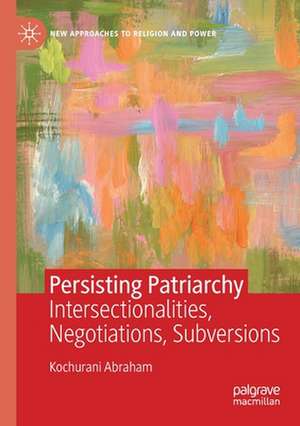Persisting Patriarchy: Intersectionalities, Negotiations, Subversions: New Approaches to Religion and Power
Autor Kochurani Abrahamen Limba Engleză Paperback – 25 aug 2020
| Toate formatele și edițiile | Preț | Express |
|---|---|---|
| Paperback (1) | 580.17 lei 6-8 săpt. | |
| Springer International Publishing – 25 aug 2020 | 580.17 lei 6-8 săpt. | |
| Hardback (1) | 585.57 lei 6-8 săpt. | |
| Springer International Publishing – 24 aug 2019 | 585.57 lei 6-8 săpt. |
Din seria New Approaches to Religion and Power
-
 Preț: 197.67 lei
Preț: 197.67 lei - 18%
 Preț: 728.43 lei
Preț: 728.43 lei -
 Preț: 386.81 lei
Preț: 386.81 lei -
 Preț: 381.00 lei
Preț: 381.00 lei -
 Preț: 384.86 lei
Preț: 384.86 lei -
 Preț: 388.72 lei
Preț: 388.72 lei -
 Preț: 395.47 lei
Preț: 395.47 lei -
 Preț: 386.81 lei
Preț: 386.81 lei - 9%
 Preț: 637.60 lei
Preț: 637.60 lei - 15%
 Preț: 524.04 lei
Preț: 524.04 lei - 18%
 Preț: 781.15 lei
Preț: 781.15 lei - 15%
 Preț: 583.93 lei
Preț: 583.93 lei -
 Preț: 187.20 lei
Preț: 187.20 lei - 9%
 Preț: 740.55 lei
Preț: 740.55 lei - 18%
 Preț: 724.94 lei
Preț: 724.94 lei - 18%
 Preț: 784.61 lei
Preț: 784.61 lei - 18%
 Preț: 719.44 lei
Preț: 719.44 lei - 18%
 Preț: 726.23 lei
Preț: 726.23 lei - 5%
 Preț: 370.38 lei
Preț: 370.38 lei -
 Preț: 385.84 lei
Preț: 385.84 lei -
 Preț: 384.86 lei
Preț: 384.86 lei -
 Preț: 381.98 lei
Preț: 381.98 lei -
 Preț: 389.11 lei
Preț: 389.11 lei - 15%
 Preț: 643.34 lei
Preț: 643.34 lei -
 Preț: 386.81 lei
Preț: 386.81 lei -
 Preț: 381.00 lei
Preț: 381.00 lei -
 Preț: 386.81 lei
Preț: 386.81 lei
Preț: 580.17 lei
Preț vechi: 682.55 lei
-15% Nou
Puncte Express: 870
Preț estimativ în valută:
111.03€ • 115.49$ • 91.66£
111.03€ • 115.49$ • 91.66£
Carte tipărită la comandă
Livrare economică 15-29 aprilie
Preluare comenzi: 021 569.72.76
Specificații
ISBN-13: 9783030214906
ISBN-10: 3030214907
Pagini: 241
Ilustrații: XV, 241 p. 5 illus.
Dimensiuni: 148 x 210 mm
Greutate: 0.31 kg
Ediția:1st ed. 2019
Editura: Springer International Publishing
Colecția Palgrave Macmillan
Seria New Approaches to Religion and Power
Locul publicării:Cham, Switzerland
ISBN-10: 3030214907
Pagini: 241
Ilustrații: XV, 241 p. 5 illus.
Dimensiuni: 148 x 210 mm
Greutate: 0.31 kg
Ediția:1st ed. 2019
Editura: Springer International Publishing
Colecția Palgrave Macmillan
Seria New Approaches to Religion and Power
Locul publicării:Cham, Switzerland
Cuprins
1. Introduction.- 2. Spatial Inscriptions of Kerala: The Historical and Sociocultural Context of Catholic Syrian Christians.- 3. Theorizing Patriarchy: An Inquiry into the Politics of Domination.- 4. Politics of Gender: The Undercurrents of Patriarchy in the Life of Catholic Syrian Christian Women.- 5. Religion and Patriarchy Gendered Inscriptions on Religious Beliefs and Practices.- 6. The Politics of Negotiating and Subverting Patriarchy.- 7. Conclusion: From Politics of Survival to Politics of Subversion.
Notă biografică
Kochurani Abraham is a feminist theologian and gender researcher from Kerala, India. At present she is the National Convener of the Indian Christian Women’s Movement (ICWM) and the Vice-President of the Indian Theological Association (ITA). Her research interests include gender, ecology, spirituality and transformative education.
Textul de pe ultima copertă
This book examines the operational dynamics of patriarchy that is deeply woven into the Indian cultural fabric and its persistence in spite of women advancing in Human Development Indices. In studying the situation of women of the Catholic Syrian Christian community of Kerala, South India, as a case of analysis, Kochurani Abraham identifies caste consciousness and religious prescriptions of this community as the main factors that intersect with gendered identity construction and succeed in keeping women within its patriarchal confines. While women do engage in negotiating patriarchy through what can be termed simulative, tactical, and ‘agensic’ bargains, this remains a ‘politics of survival’ as it does not challenge the established gender order. In this context, making a shift from ‘politics of survival’ to a ‘politics of subversion’ is imperative for challenging persisting patriarchies.
Caracteristici
Opens a critical window to the implications of the religious mediation of patriarchy as manifested in the caste inscribed Catholic Syrian Christian community of Kerala Considers the varied expressions and experiences of patriarchy at the intersectionality of gender with class, caste and religion Examines the latent contradictions underlying the development paradigm by bringing into relief the ‘gender paradox’ of the human development discourse
